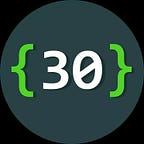Writing a simple computer science resume
4 min readAug 20, 2021
Make a copy of this, turn it into a pdf, or store it on your computer. We think these are the most important points to consider when writing a computer science resume. Read, research, and explore more to choose what’s best for you! Let us know how we did @ 30dayscoding@gmail.com. Good luck, you’ll do great!
Templates
- Career cup: What a GOOD Resume Should Look Like
- Overleaf: Jake’s Resume Template (preference)
- Github: Deedy-Resume Template
- It’s perfectly acceptable to have a simple resume. Nothing fancy is required — No images, colors, fancy fonts, headings, quotes, etc.
Action words
- Make sure every line starts with an action word:
- Eg: Worked on, Created, Added, Implemented, Discovered, Generated, Collaborated, Researched, Managed, etc.
- 240 Resume Words: Action Verbs
- 185 Powerful Action Words
Work experience
- Ideally 3–4 experiences with 2–3 points each.
- Make sure the dates are accurate and consistent in style. Include the year and the month or season.
- Common headings: software engineer, web developer, mobile developer, intern etc.
- Add a line at the end for Tools: Angular, Flutter, Dart, Testing, etc.
- Don’t add things like: using VSCode, Vim, etc. No one wants to know your code editor preferences.
- You CAN add experiences outside of coding/computer science if you learned something new and have space for it. It’s better to show real experiences than nothing!
Examples
- Added some features using frontend technologies, which eventually went into production.
- Worked on something which brought the revenue up by some %.
- Implemented login functionality with authentication service using Firebase and Node JS.
Projects
- Ideally 3–4 projects with 1–2 points each.
- Use school projects if you don’t have any personal projects (start working ☺).
- Mention the skills you learned or used. Eg: HTML, CSS, JS, Git.
- It’s fine to add other projects as well — maybe you did marketing for someone and helped them increase their numbers!
Examples
- 30dayscoding: Made a website for computer science students preparing for coding interviews which includes an all-in-one technical interview guide.
- Created a landing page for the website to generate initial traffic before launch.
- Worked as a freelancer to create 3 pages using something, something.
Education
- A lot of people argue that education should come before work / projects. That’s a myth.
- Add your degree, courses, clubs, activities, experiences, projects, etc. You can mention jobs you did at your university.
- Eg:
- B.S. in Computer Science, 2020.
- GPA: doesn’t matter.
Skills
- Add programming languages, tech stacks you’ve used / are learning.
- Languages: Python; Java; Dart; JavaScript; Typescript.
- Technology: Android; Flutter; React Native.
- It’s fine to fake-it-till-you-make-it when submitting your resume, but make sure you know it before your interviews.
- You can also add soft skills — they can help the resume parse through the ATS software. Eg: communication, leadership etc.
Summary
- Don’t add a summary section unless you have space for it. Most resumes pass through an ATS software before being viewed by someone, so don’t waste time on a summary.
- Generic things can be avoided most of the time. Everyone is a ‘hardworking software engineer with excellent skills’, don’t add it here. Instead, add it in the skills section (if you have space).
Links
- Add links to your Github, linkedin, Angel list, Twitter profiles.
- A lot of times. managers and recruiters who look at these profiles will directly contact you, so it’s nice-to-have.
- Github: Add school projects (with permission) if you don’t have any personal ones, or just fork other repositories that you like. Keep exploring!
Harsh reality
- Only a limited number of people look at your resume!
- Recruiters or managers screen it after you’ve cleared your first round of online coding interviews.
- Even then, they will ask you to explain most things — ‘what’s your favorite project’, or ‘which tech stack are you most comfortable in’ — they want you to explain it.
- Don’t put in a lot of time.
- It’s fine to have a decent resume, but preparing for interviews or actually making projects is far more important.
- Apply to a limited number of companies, prepare for those, and focus on clearing the interviews you get. Prepare well!
- Getting a first round interview from a hundred companies <<<< Getting an offer from 1 company after applying to 10.
- Don’t pay someone to do a resume review: Ask your friends or someone in your university — consultants, advisors, professors, etc. Lookout for free resources like this one.
- Your resume is only looked at for 5–6 seconds.
- Make sure to keep that in mind when displaying your skills. Use actionable items like numbers, percentages, etc.
Don’t follow this blindly
- This comes from our personal experiences, so don’t take it too seriously, and feel free to make tweaks according to what you think is the best. Everything doesn’t work for everyone, so experiment along the way.
Good luck
- Your resume doesn’t define you, you’re worth much more than that. If you’re looking for a job/internship — we hope you get it soon! Keep working hard. Checkout 30 days coding if you’re preparing for coding interviews.
